How many other front-line sailing administrators anywhere in the world would have noted the February announcement of the postponement of the new James Bond movie’s global premiere in London from early March 2020 away back until November, and immediately realised that this profoundly affected their own organisation’s sailing plans for 2020?
Yet Jonathan Nicholson, Commodore of the 136-year-old Dublin Bay Sailing Club, was right there.
“The people running the James Bond franchise are producing the most successful longterm film brand in the world. And in addition to the antennae of their huge fan base, their financial muscle is such that they can access research findings and semi-secret scientific and medical information, plus commercial insight, which may even be denied to national governments. Before most organisations, they knew how bad it was going to be, and acted swiftly.
So when the announcement was made, I told the DBSC committee that this suggested a completely game-changing lockdown was on the way, and we needed to start preparing ourselves and talking to other harbour stake-holders about the inevitability of a limited Dublin Bay sailing season in 2020, a truncated season like nothing that has ever been seen before outside wartime.”
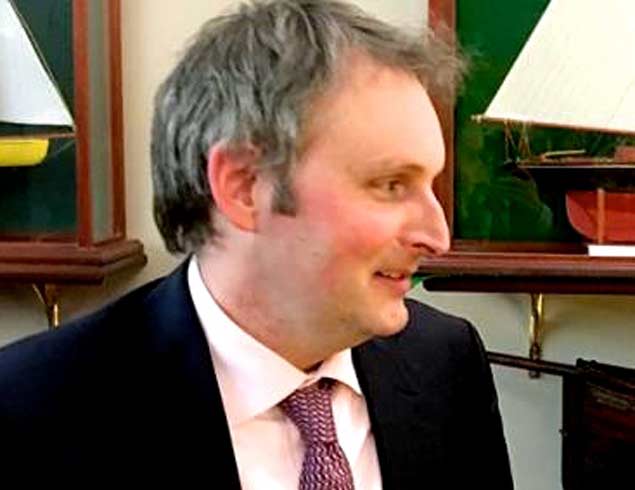 Jonathan Nicholson, Commodore of Dublin Bay Sailing Club, which is possibly the largest specifically yacht racing club in the world
Jonathan Nicholson, Commodore of Dublin Bay Sailing Club, which is possibly the largest specifically yacht racing club in the world
Jonathan Nicholson was so far ahead of the curve that for a while he was in a different orbit, though the lateral thinking he was displaying was also seen in Howth, where the Organising Committee for the Wave Regatta - scheduled for the end of May - promptly re-set it well into the Autumn on September 11th to 13th.
This was done at a time when most folk thought the basic season – both local, national and international - might yet be saved. And some clung to that optimism for a remarkably long time. Thus for the rest of us, right now is the weekend where we find we really are looking into the black abyss of the major cancellations which have blown away much of the international sailing season of 2020 around Ireland. For although it’s staged annually on the other side of the North Channel, the time-honoured Scottish Series based at Tarbert on Loch Fyne in the final UK Bank Holiday of May has always attracted a significant contingent of hardy Irish cruiser-racers.
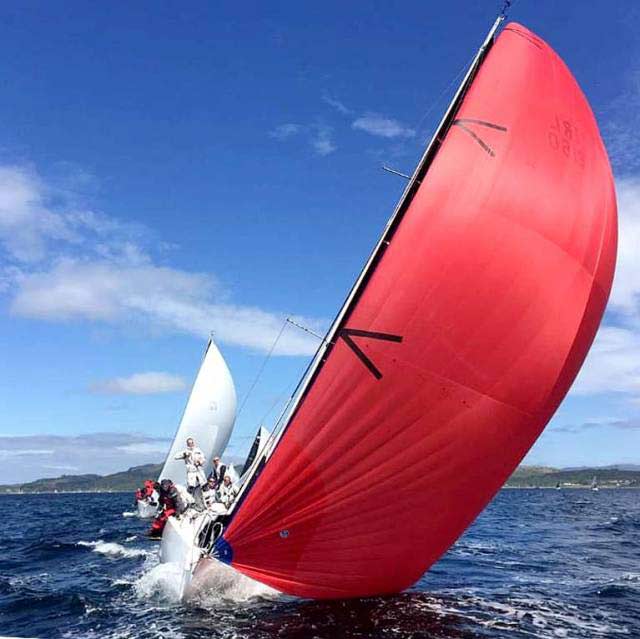 Scottish Series racing in 2019 off Tarbert, when conditions were as varied as they are this weekend with the regatta cancelled. You could be getting sailing like this on bright blue water as the sun glints on the snow still atop the mountains of nearby Arran. Photo: Marc Turner/CCC
Scottish Series racing in 2019 off Tarbert, when conditions were as varied as they are this weekend with the regatta cancelled. You could be getting sailing like this on bright blue water as the sun glints on the snow still atop the mountains of nearby Arran. Photo: Marc Turner/CCC
Sometimes they’ve been from very distant parts of Ireland. But wherever the home ports to which they eventually return may be, over the years they’ve returned with more than their fair share of the major Scottish trophies to launch their international and national season. And even for those cruiser-racers in Ireland that don’t take on the sometimes formidable logistical challenge of a campaign on Loch Fyne with its often volatile late Spring weather, the fact of it having taken place is a major marker for the new season being properly under way.
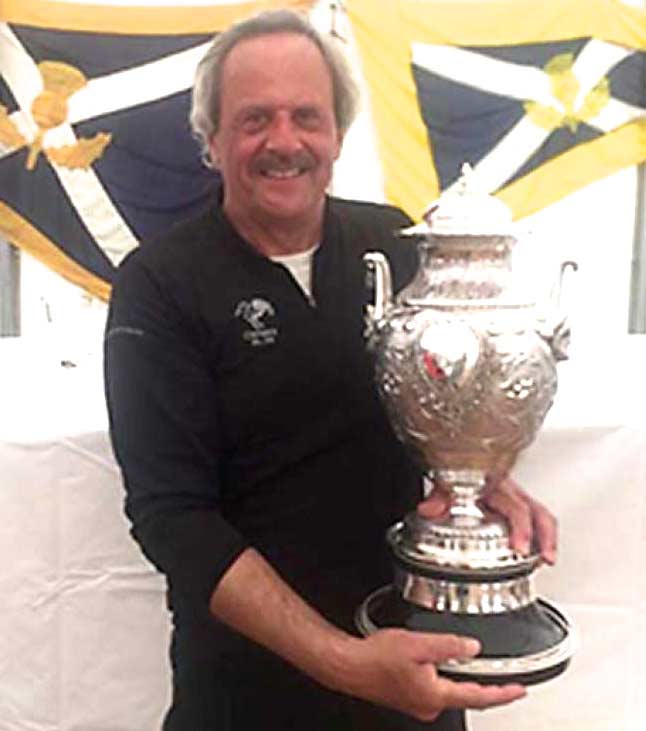 Memories, memories – Andrew Craig with the supreme trophy at Tarbert, Monday May 27th 2019. He was to be declared the Afloat.ie “Sailor of the Month” for May 2019 on Saturday June 1st – his birthday
Memories, memories – Andrew Craig with the supreme trophy at Tarbert, Monday May 27th 2019. He was to be declared the Afloat.ie “Sailor of the Month” for May 2019 on Saturday June 1st – his birthday
Its non-staging this weekend really does bring home to us the level of programme destruction which has been wreaked. For sure, we don’t have to look beyond Ireland’s shores to be aware of major cancellations whose dates have already been passed. But the fact that key fixtures such as the Irish Sailing Youth National Championship in Howth from 16th to 19th April was scrubbed didn’t seem so total, for surely there’lI be other junior events in Ireland which can be given added stature once the season gets under way in some form?
Then too, ISORA races in the Irish Sea in April and May haven’t taken place, and neither have the regular club early season sailing programmes all round our coast. However, they’re in or near Ireland, and if we can just get sailing going, we can work on substitute events of some sort, so their loss doesn’t seem as total as the Scottish void.
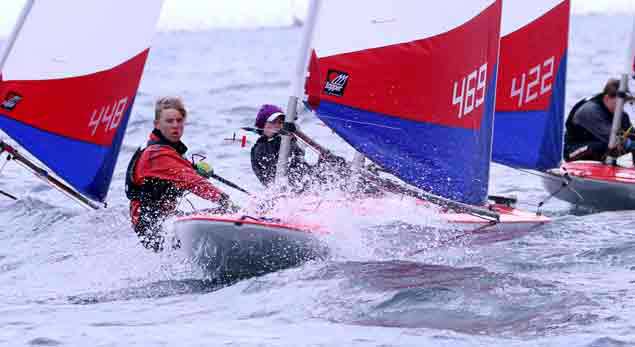 Toppers racing in the annual Irish Sailing Youth Nationals. When the 2020 staging at Howth for 16th to 19th April was cancelled, the Covid-19 pandemic was at its height in Ireland, but as the Youth Natinals were an in-Ireland event, it was felt that some of the competition could be subsumed into other junior events later in the year as sailing resumed
Toppers racing in the annual Irish Sailing Youth Nationals. When the 2020 staging at Howth for 16th to 19th April was cancelled, the Covid-19 pandemic was at its height in Ireland, but as the Youth Natinals were an in-Ireland event, it was felt that some of the competition could be subsumed into other junior events later in the year as sailing resumed
But the Scottish Series 2020 is gone, gone utterly, and gone so completely that at this stage it isn’t good for our mindset to become nostalgic about some of the heroically successful Irish campaigns through it in times past. Instead, its complete absence should be quietly noted while we focus on how best to make use of a season whose long-planned international pillar events have been blown away, yet with every passing day it seems to offer some form of a possible racing programme afloat for the home fleet.
But that is only the case provided the virus-combatting programme can continue it current steady success, though it was alarming to note this week that the relevant authorities have only just added the loss of a sense of smell or taste as important possible indicators of Covid-19 infection. The World Health Organisation has been telling us this for months, most reasonably switched-on folk have long since taken it on board, and it does make you wonder what’s going on in Ireland’s corridors of epidemological power if they’ve only just decided to go public with these very useful indicators.
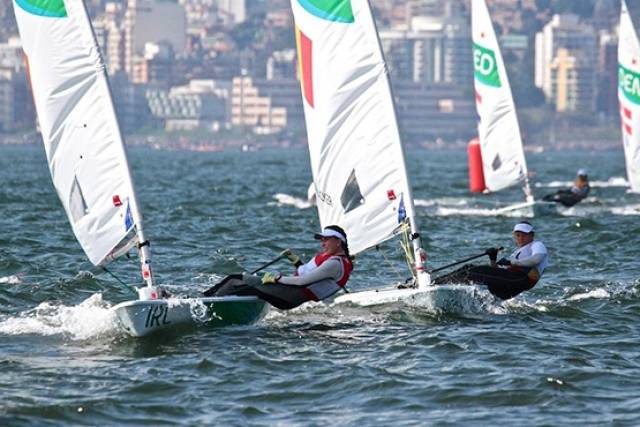 Annalise Murphy on her way to securing the Silver Medal at the Rio Olympics, August 16th 2016. At times like this, everyone in Ireland is a sailor. But when regulations are being imposed to combat a pandemic, we are seen as a minority sport, and have to defend our corner and come up with our own creative solutions.
Annalise Murphy on her way to securing the Silver Medal at the Rio Olympics, August 16th 2016. At times like this, everyone in Ireland is a sailor. But when regulations are being imposed to combat a pandemic, we are seen as a minority sport, and have to defend our corner and come up with our own creative solutions.
In taking a broader view of this all, we’re reminded yet again that sailing and boat sports are still a minority activity in Ireland, even if public interest perks up no end when an Olympic medal is brought into the picture. That’s as may be, but for people who go afloat, and particularly for those who own boats or are in charge of them, there’s a feeling of square pegs being forced into round holes, of coastal regulations being drafted by officials who are rather more aware of the rules of the road ashore and the regulation of shoreside public places than they are of the realities of getting a boat around the sea, lake, river or canal.
 The ideal laboratory for testing the return of sailing? With its relatively isolated location in a secured compound in the middle of a harbour at the end of a peninsula, the Howth Yacht Club marina/clubhouse complex provides a versatile controlled facility to monitor the post-pandemic resumption of sailing.
The ideal laboratory for testing the return of sailing? With its relatively isolated location in a secured compound in the middle of a harbour at the end of a peninsula, the Howth Yacht Club marina/clubhouse complex provides a versatile controlled facility to monitor the post-pandemic resumption of sailing.
In getting things going again, Howth provides a perfect laboratory setting for the experiment, so much so that perhaps the place would be best run by clinically-qualified personnel in white coats. That’s as may be, but as the Howth Yacht Club marina/clubhouse complex is in a distinct enclosed compound isolated in the middle of a harbour which is in turn on the end of a peninsula connected to nearby Ireland only by a very narrow isthmus, it’s all a very manageable control setup.
HYC Commodore Ian Byrne is enthusiastically leading his members afloat this weekend as they pioneer a return to structured sailing, a return which will be observed by other sailing centres and monitored by the authorities in charge of the Covid-19 Lockdown-easing regulations, some of which are open to several interpretations.
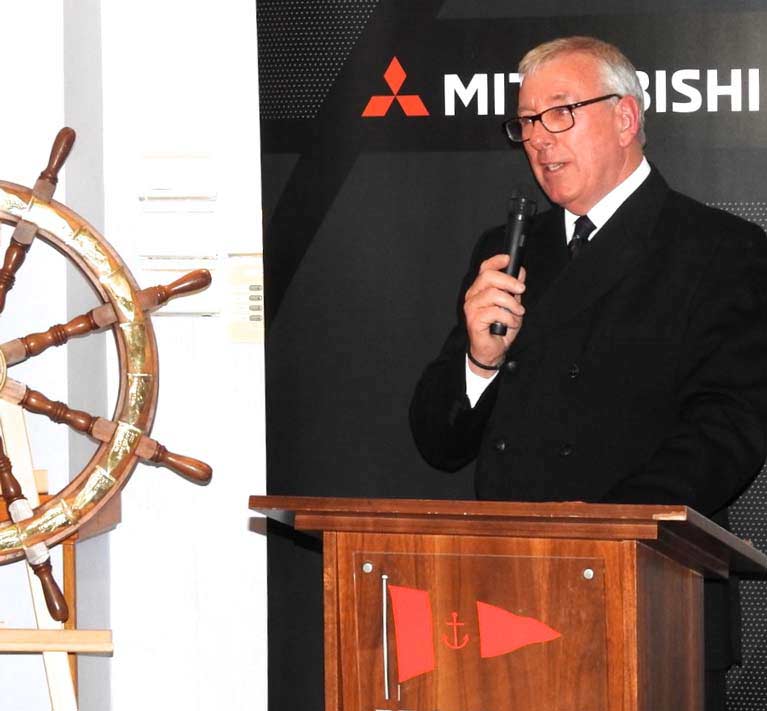 The pioneer. Howth Yacht Club Commodore Ian Byrne has played the leading role in his club’s planning to resume sailing this weekend. He is seen here speaking at the ceremony when Howth YC became the Mitsubishi Motors Sailing Club of the Year 2019. Photo: John Deane
The pioneer. Howth Yacht Club Commodore Ian Byrne has played the leading role in his club’s planning to resume sailing this weekend. He is seen here speaking at the ceremony when Howth YC became the Mitsubishi Motors Sailing Club of the Year 2019. Photo: John Deane
The conflicting interpretations could become most acute in Dun Laoghaire, with the largest single concentration of boats in Ireland. Whatever about the Harbour Authorities still struggling to find their way since the running of this magnificent, historic and very useful structure was transferred to Dun Laoghaire and Rathdown County Council, the four waterfront yacht clubs - and their over-arching racing authority in Dublin Bay Sailing Club - have to be exemplary in the efficiency of their administration, for they achieve a very great deal within very limited waterfront spaces.
Thus a visitor to a Dun Laoghaire club – particularly in winter – can sometimes be surprised to find that all the space around the club is filled with boats. For in addition to providing all the traditional amenities of a yacht club, the waterfront of Dun Laoghaire is so unevenly organised and lacking in standard yacht harbour commercial facilities in any profusion – for instance, MGM Boats have the harbour’s only Travelhoist – that the yacht clubs have had to develop themselves as boat storage and maintenance units in addition to providing everything else you expect in a classic yacht club from billiard championship tables through hospitable bars and well-stocked libraries and modern and extensive changing facilities to fine dining rooms.
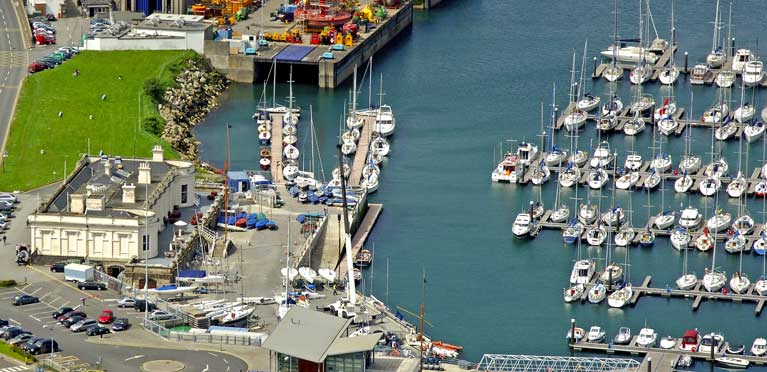 The Royal Irish Yacht Club in summer, with dry-sailed keelboats at the east end of the extensive hard-standing area. In winter, this entire space is filled with member’s boats. Under the current Covi-19 delay, the annual lift-in scheduled for 29th March was changed to a phased process from 18th May, and normality will have resumed by the end of June.
The Royal Irish Yacht Club in summer, with dry-sailed keelboats at the east end of the extensive hard-standing area. In winter, this entire space is filled with member’s boats. Under the current Covi-19 delay, the annual lift-in scheduled for 29th March was changed to a phased process from 18th May, and normality will have resumed by the end of June.
It is all done so well that most sailors wouldn’t wish it any other way, even if the Dun Laoghaire club boat storage arrangement is akin to the sacred lawns beside the Royal Yacht Squadron in Cowes being filled with the members boats during the off-season. Yet in order to function smoothly, it all has to be run with almost military precision, and the successful implementation of annual lift-in day at each club is key to it all.
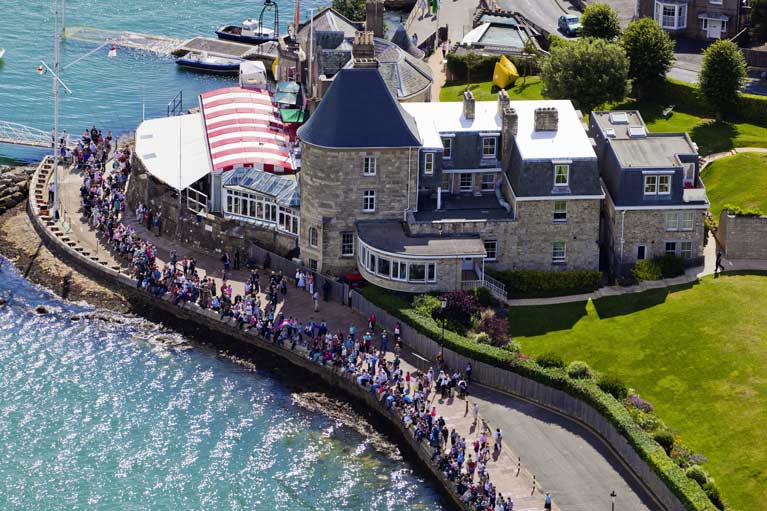 The Royal Yacht Squadron in Cowes. Were it based in Dun Laoghaire, the hallowed lawn on the right in the photo would be used for members’ boat storage during the winter. Photo Rolex.
The Royal Yacht Squadron in Cowes. Were it based in Dun Laoghaire, the hallowed lawn on the right in the photo would be used for members’ boat storage during the winter. Photo Rolex.
But once this massive exercise in logistics and combined effort is completed, there will be a significant fleet of boats in Dun Laoghaire ready and keen to go sailing in mid-June, with their owners expecting that sailing to be administered with the same efficiency as their shoreside arrangements, and this is where Dublin Bay Sailing Club comes in, still thinking nimbly on its feet despite having been founded way back in 1884.
But as Commodore Jonathan Nicholson ruefully admits, with such a large organisation having to work in co-ordination with so many other clubs and bodies while keeping its own membership happy, “there may be times when we can alter course as quickly as a rally car making a handbrake turn, but at other time you’d be reminded of the supertanker which continues in the same heading for six miles after the rudder has been put across”.
He combines the wide experience of an active cruiser-racing enthusiast –he recently traded up from a vintage 34ft Dehler DB to a Frers-designed Puma 42 – with the busy mind of an innovative thinker, and no sooner had the enormity of the coming closedown become apparent than he was thinking: “This is a crisis which we mustn’t allow to go to waste”.
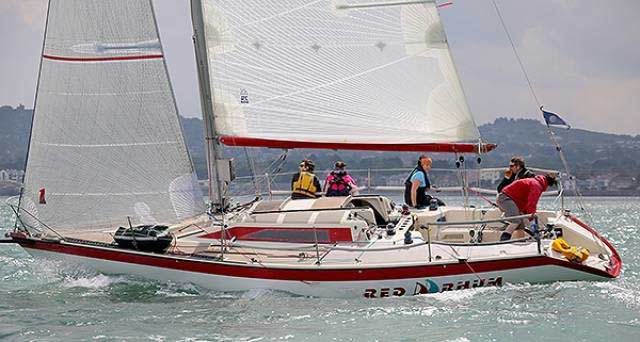 Jonathan Nicholson with the Dehler DB Red Rhum demonstrating the kind of “family & household” crewing arrangements which are required under the regulations. Photo: Afloat.ie/David O’Brien
Jonathan Nicholson with the Dehler DB Red Rhum demonstrating the kind of “family & household” crewing arrangements which are required under the regulations. Photo: Afloat.ie/David O’Brien
So where in a normal year all DBSC administrative energy would have been poured into being ready for racing in a programme instantly into its full-powered multi-course activity on 22nd April, Jonathan Nicholson and DBSC Honorary Secretary Chris Moore and other key officers were using the unexpected opportunity to develop much more positive relations with other harbour users, such that when some semblance of normality returns to sailing and harbour user’s generally, there’ll be a more active structure available among the “consumer” bodies to advise about what the market really needs.
As to the reality of dates, while everyone emphasises that we have to be prepared to accept that it may all change from day to day as the latest Covid-19 figures are analysed and the experience from Howth is dissected, at the moment in Dun Laoghaire the semi-official view is that there’ll be informal short-handed and household sailing in mid-June and possibly earlier, things will accelerate by 28th June at the latest, and the realistic (or should that be the most pessimistic) opinion is that full sailing will be on from July 20th.
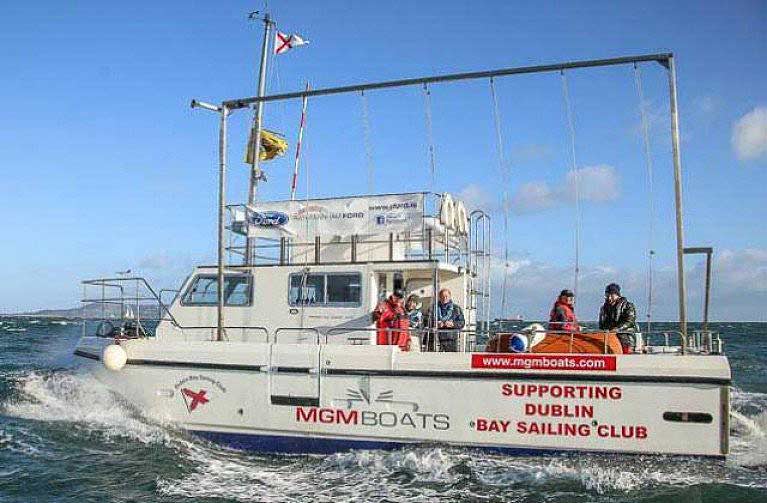 Freebird, one of the DBSC Committee Boats, which will be healthily isolated from shore gatherings, and managed by a regulation-compatible crew. Photo: Afloat.ie
Freebird, one of the DBSC Committee Boats, which will be healthily isolated from shore gatherings, and managed by a regulation-compatible crew. Photo: Afloat.ie
That’s what should be possible on the water, where another aspect is that health-certified crews in ISORA events may be able to complete their offshore events based on entirely on race trackers. But it’s when there’s a significant shoreside element to it all that completely new factors of maintaining social distance from relative strangers from outside your safety bubble comes into the equation, so much so that Jonathan Nicholson can chuckle as he contemplates a scenario whereby Dublin Bay Sailing Club can complete a reasonably comprehensive season afloat while complying with regulations, yet when his time to stand down after his period as Commodore comes at the AGM in November, it mightn’t be a crowded and busy AGM in the classic and time-honoured DBSC style, but rather we’ll see an austere though technically-complex Zoom-facilitated gathering of virtual communication.
Whatever develops, we can be sure that as June moves on, the impressive DBSC programme will gradually come on stream as the fluid situation develops, such that by July there’ll be those impressive DBSC Thursday turnouts of cruiser-racers on such a scale that if there’s a demand for a pop-up or flash-mob regatta to fill the void of cancelled established events, it’s not unreasonable to point out that, in effect, Dublin Bay Sailing Club stages a big fleet Twilight Regatta every Thursday evening.
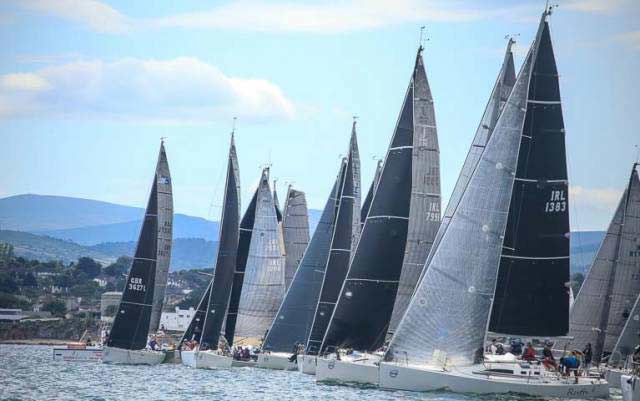 On the edge of the city, under the hills and mountains….Dublin Bay sailing is at such a level that, in effect, a complete Twilight Regatta is sailed every Thursday evening between April and September. Photo: Afloat.ie/David O’Brien
On the edge of the city, under the hills and mountains….Dublin Bay sailing is at such a level that, in effect, a complete Twilight Regatta is sailed every Thursday evening between April and September. Photo: Afloat.ie/David O’Brien
The magic ingredient is that almost everyone taking part lives in the South Dublin area. Extensive travel and the shoreside mixing of strangers is not a significant factor. Yet while Dun Laoghaire can contemplate all this taking shape before the end of June, down in Kinsale they’ve had to cancel the Dragon Gold Cup scheduled for September, as it would involve global travel and much shoreside socialising, and there’ll be parts of the world where Covid-19 is still rampant, while in other parts the much-mentioned Autumnal Second Wave might already be under way by that time.
As it is now, the fact that we’re all very much in this together – and rightly so – does mean that at times it’s as though the entire population is like a wartime Transatlantic convoy, obliged to travel at the speed of the slowest ship. Thus although there are reasonably fit and healthy cohorts of society - such as the more active members of the sailing community - who are surely less at risk than many other groups, the official policy on phased easing of the Lockdown restrictions is definitely skewed towards the recovery speeds of the more vulnerable groups.
The care of the most vulnerable members of a society is a good indicator of its civilization. But after more than two months of economically-debilitating lockdown, there’s a danger that the conscientiously civilised society will find itself in a situation where destitution is inevitable, and far from continuing to be civilised, the Law of the Jungle will start to take over unless a balanced and timely relaxation of Lockdown takes place.
In times of emergency, the provision of essential services may be seen as paramount. But where does the line get drawn between essential services and popular activities with a positive economic input?
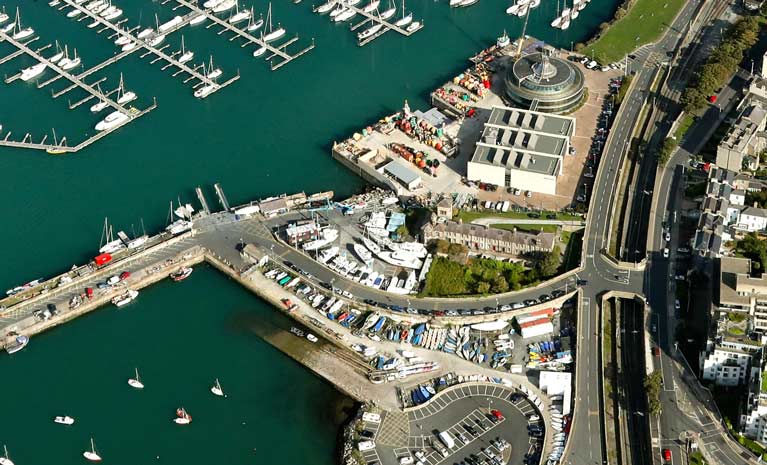 A significant income generator in a modern industry – the MGM Boats boatyard in Dun Laoghaire at the centre of this photo may not have been part of the original plan for the Harbour 200 years ago, but it is now one of several economically-important units functioning in today’s recreationally-oriented port. Photo: Barrow Coakley/Simon Coate
A significant income generator in a modern industry – the MGM Boats boatyard in Dun Laoghaire at the centre of this photo may not have been part of the original plan for the Harbour 200 years ago, but it is now one of several economically-important units functioning in today’s recreationally-oriented port. Photo: Barrow Coakley/Simon Coate
It’s not so long ago that the sports and hospitality industries would not have been regarded as serious economic activities, yet nowadays their contribution to GDP is much greater than that of many of the brutal old heavy industries, and in crudely measureable financial terms, they’re right up there with our beloved agriculture, however much that agriculture may have in greater socioeconomic significance.
So however much the powers-that-be are engrossed in their pandemic-dealing manoeuvrings with at least one eye always on the popular vote, it’s reassuring to know that in our main sailing centres, there are efficient and imaginative club officers who take the situation as they find it, and devise feasible programmes which benefit their members and the sport in general.
































































